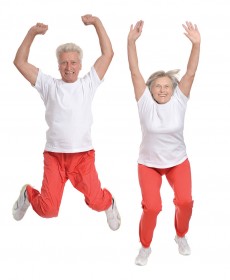 Natural Sciences
Natural Sciences
Whose Muscles Fatigue More Quickly?

It turns out that the phrase “You’re not getting older, you’re getting better” may have more scientific truth to it than one might imagine.
For example, some older people actually experience lower levels of muscle fatigue from exercise than younger people. You read that right: The muscles of healthy people in their 70s actually tire less quickly than those of 20-year-olds.
This is a conundrum that Anita Christie, an assistant professor of human physiology, is trying to sort out. Christie studies how nerve impulses traveling between muscles and the brain change with age. She’s looking for clues that could lead to treatments that would help older people maintain muscle control and slow the onset of frailty.
Christie starts with older adults who have retained mobility and muscle control, a group she calls “healthy agers.” She wants to know what sets them apart from adults of the same age who have become frail or infirm.
“You can take two 75-year-old people and they can look very different from a functional standpoint,” Christie said. “In some cases exercise or physical activity has a lot to do with it, but that doesn’t explain everything.”
She’s found that muscles in healthy older adults tend to get their energy from oxygen, whereas muscles in younger people get fuel from a sugar known as glucose. The process in older adults produces less of a signal that tells the brain the muscle is tired, giving older people the ability to use the muscle longer.
Unfortunately, people also lose muscle mass and strength as they age. That more than offsets the gain in endurance and prevents grandpa and grandma from spending their retirement years as members of the League of Superheroes.
Because of that muscle loss, it’s important that older people are able to get everything they can out of the muscles they have, which is what brings Christie back to the healthy seniors.
“If we can understand the physiology of what’s going right in the healthy agers,” she said, “we can apply that to interventions for those people who are not frail yet but who are on the brink of getting there.”
Christie also has learned that in older adults who have mobility problems, muscles tend to work like those in younger people. They get their energy from glucose, producing the chemicals that tell the brain the muscle is tired.
Combined with the loss of muscle strength, this places frail adults in a downward spiral. Christie will soon begin studying muscle fatigue in frail adults in an effort to keep them on the move.
“We understand the muscle-response mechanism now,” she said. “Next, we want to see if we can do something to buffer it.”
―Greg Bolt


 Twitter
Twitter Facebook
Facebook Forward
Forward